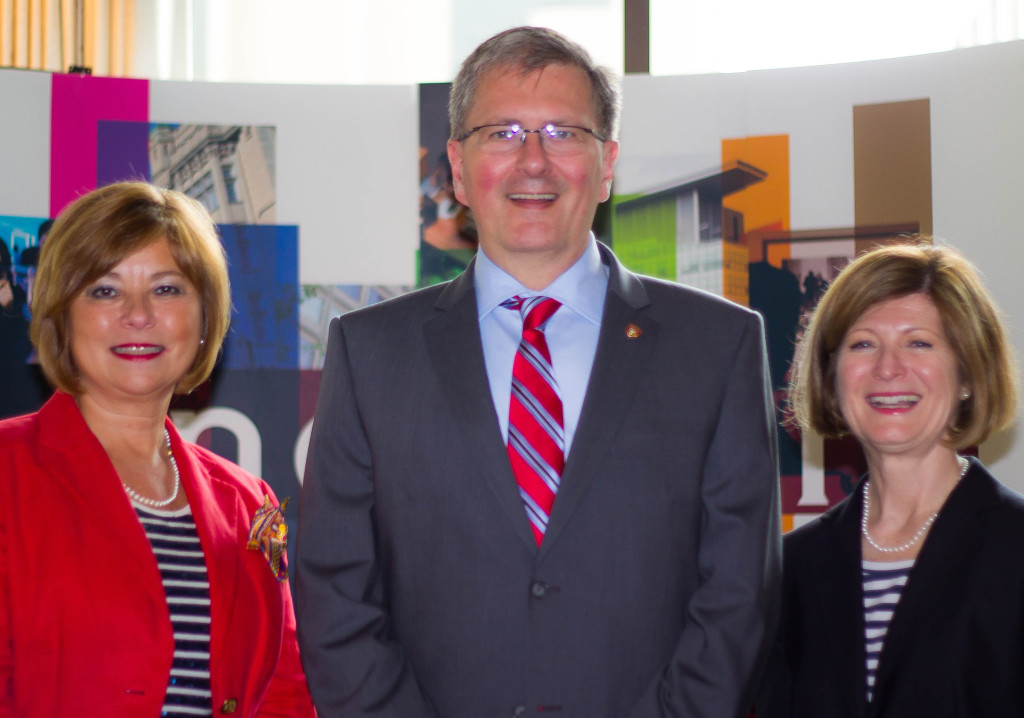Paving the way for a more welcoming province for future graduates: Concordia President Alan Shepard addresses Italian Chamber of Commerce in Canada
On May 22nd, Dr. Alan Shepard – Concordia’s president and vice-chancellor – addressed the Italian Chamber of Commerce in Canada on the topic of international students and their leaving of the province after graduation.
The meeting hall of the Omni Hotel, where the presentation took place, was packed with academics, entrepreneurs and sponsors who have long supported Concordia. Over 25 tables were filled with guests, and once everyone was seated and served some wine and salad, Shepard took the stage to begin addressing the audience.
Shepard’s presentation, called “Newcomers to Montreal and the role universities play”, presented members of the board of commerce with sobering facts about international students’ post-graduate behaviours.
According to Shepard’s statistics, Canada stands as the seventh most popular destination for students who seek to study abroad, with Montreal being the choice destination for post-secondary education. Over a 250,000 students attend higher education in the city, of which more than 10% are international students. Despite these encouraging numbers, Montreal has the lowest hiring rates of university graduates in Canada. “We’re effectively educating people for other cities,” Shepard said during the presentation. Shepard seeks to rectify this issue using four key points.
“My first idea is that we should do more in concrete ways to make newcomers feel special and welcome,” he said. “Our biggest draw is our reputation, and our biggest welcome mat is our web presence.”
But while Montreal shows a great initiative, the city’s web page is lacking in resources linking potential immigrants to Quebec’s immigration portal. Once there, the directions to reach Montreal’s page require several clicks, and many pages are only available in French. To provide a solution, Shepard pointed to what he refers to as “a more welcoming model”, referencing the web presence for New York City. The site is offered in 35 languages, engages users on social media platforms, and their immigration offices serve visitors in more than seven languages.
His second idea is to create a financial reason for international students coming into the city to stay, suggesting a tuition tax rebate applied over roughly ten years of residency.
“Even if international students pay much higher tuition rates than Quebecers, it is still low compared to what they would pay in other regions. But imagine how much more attractive Quebec would be if we could bring rates down to our unbeatable in-province tuition,” he said. This move is mirrored in other provinces across Canada: Manitoba, New Brunkswick and Saskatchewan all offer these options for international students who choose residency after graduation.
Shepard’s third idea is a project he calls “Discover Quebec”, which is aimed at out-of-province students who seek to learn French in order to make their livelihoods in the province. Despite Concordia’s “Oui Can Help” program being an excellent option for learning French, Shepard believes that “as a society, we could go further.” His project would provide newcomers with lessons about history, culture, and integrate students into learning French via co-op placements in Francophone workplaces. This, according to Shepard, would provide these students with “tangible benefits: residency status, a job offer – a place in Quebec society.”
But beyond the scope of language and culture, his fourth idea is to widen the responsibility for welcoming these immigrants into the province. La Vitrine, which Shepard uses as an example, is launching a project that will offer new international students a rebate towards theatre, fine art and other cultural activities. “Remember that culture is often the glue that keeps people here,” he said.
Addressing the Italian Chamber of Commerce in Canada directly, he suggested business owners and entrepreneurs to open up promotional offers, sponsoring an event that is popular with new Montrealers, and helping these visitors feel welcome to the province. Among all this, he also urged our focus into green spaces and good urban planning to make the city a place people want to live in.
With young professionals graduating from higher education spearheading the future of Montreal, Shepard’s ideas apply to every student and resident of the province, regardless of where they’re from.





